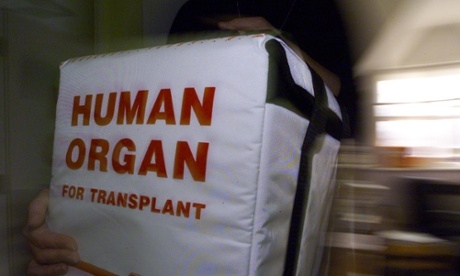
Family members refusing to consent to the organs of their loved ones being donated after they die are keeping organ donation rates in Australia low, new research has found.
While doctors were good at identifying which patients may be suitable for organ donation, low next-of-kin consent rates meant the donor rate was substantially less than the best performing countries, the study, published in the Medical Journal of Australia on Monday, found.
Researchers from the Royal Prince Alfred hospital in NSW conducted an audit of all 427 deaths at the hospital during a six-month period in 2012. Of those, 10 patients were found to be eligible for organ donation, but family members refused in half of those cases.
Of the remaining five patients, only three became organ donors because brain death in the other two occurred more than 90 minutes after life support was removed, making them ineligible because the organs would be too starved of oxygen by that time to be useable.
An author of the study, Associate Professor Michael O’Leary, who is co-medical director of the NSW Organ and Tissue Donation Service, said it highlighted just how few patient deaths led to suitable donors being found, with under 1% of those who died becoming donors.
It also meant family consent for suitable donor patients was critical, he said.
“Even if a dead patient is found to have previously consented on the organ donation register, family members of that person are always consulted and given the chance to override that,” O’Leary said.
“Nobody could imagine a system where family members who were completely opposed to organ donation were made to sit and watch as their loved one was wheeled out of an intensive care unit for organ donation.
There were a number of reasons people refused consent, he said.
“But for many, it’s a highly traumatic time for them and sometimes it’s just not something they can think about,” he said.
Australia has an opt-in organ donation register, but O’Leary said several reviews had found an opt-out system made little difference to donation rates, because family were still given the final say.
It meant ensuring clinicians are well-trained in discussing organ donation with bereaved family members and highlighting its benefits, and ensuring people signed up to the organ donation register, were essential to driving up donation numbers, he said.
“If you are an unfortunate person whose loved one who has become brain-dead in an intensive care unit, if you say no to donation, it’s not like there will be another donor the next day. It’s such a rare event.”
The study marked the first time a comprehensive audit of all deaths in an Australian hospital had been carried out to identify the organ donation potential of those patients.
It follows the release earlier this month of the Organ and Tissue Authority performance report by the federal health minister, Fiona Nash.
There were 378 organ donors last year, that report found, a decrease of 3% from the previous year. Those donors helped 1,117 patients, with one organ or tissue donor helping up to 10 people.
Research shows that more than 60% of Australian families give consent for organ and tissue donation to proceed, jumping to 80% when families know and have discussed the donation decision of their family member.
“In 2015 we will focus on continued change in clinical practice such as increasing the number of identified potential donors, improving the donation process for loved ones and enhancing IT systems to support organ and tissue donation and transplantation,” Nash said.
